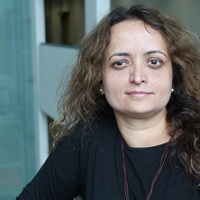ADD THESE DATES TO YOUR E-DIARY OR GOOGLE CALENDAR
This site is part of the Siconnects Division of Sciinov Group
This site is operated by a business or businesses owned by Sciinov Group and all copyright resides with them.
ADD THESE DATES TO YOUR E-DIARY OR GOOGLE CALENDAR

University of London, United Kingdom
Title:Discourses of care, wellbeing and human rights: a case study of Saving Mothers’ Comadronas’ understanding of reproductive health in Guatemala in the misinformation age
Sexual and reproductive health rights have come under attack particularly in the last years across the world, amid the rise of far right populist groups from Europe to Latin America and the US, amid the counter-framing of discourses against the ‘women’s rights’ agenda during the 1980s and 1990s (Friedman, 2003). In the post-pandemic context, and among a growing disillusionment with Western institutions, there has been a proliferation of misinformation and manipulation of reproductive health matters online (Malki et al, 2023; Selvi et al, 2024; John et al, 2024). The pushback on women’s health rights, particularly when it comes to more vulnerable groups like indigenous women, has necessitated new approaches for targeted communication strategies by health NGOs on sexuality and reproductive health rights (SRHR). To assess indigenous women’s understanding of health communications on SRHR, this study conducted focus groups with the Comadronas of Saving Mothers in Guatemala to explore their reception to these messages. Results underscored the difficulties of access of these groups to quality information.
Operating under various socio-economic and geopolitical constraints that have impacted their communications and messaging on reproductive health rights (author, 2023), various women’s health NGOs worldwide have faced many challenges in their advocacy on SRHR, from India to Brazil and the US, many NGOs have been targets of conservative attacks on reproductive health orchestrated by political ‘populist’ groups as part of their crusade against a supposedly ‘imposed gender ideology’ on governments and communities by feminists, challenging their efficacy in their communities (author, 2023).
A lack of access to health literacy resources, limits the capacity of women, girls and other community members to navigate through the political manipulation and media misinformation, which does not necessarily solely circulate online, and is an element of a wider manipulated rhetoric on SRHR in the mediated (global) public sphere (author,2023). As author (2023) has evidenced, the consumption of ‘hard facts’ on sexuality and reproductive health is not enough. Rather, people need to feel more connected to the messages at an emotional level, relating these to their lived experiences.These findings resonate with other results from the literature on science communications (Nutbeam et al, 2018; Scrimshaw, 2019), which revealed how people process ‘scientific facts’ through a series of filters. Furthermore, a growing body of literature underscores the rise of misinformation on reproductive health online within different local and global contexts (e.g. Malki et al, 2023; John et al, 2024), threatening to harm health outcomes and making it more challenging for women to navigate a polarised information landscape. This is particularly more pronounced for Latin American women’s indigenous communities, who are also inserted within deeply rooted authoritarian, patriarchal and highly unequal societies
Dr Carolina Matos is a Senior Lecturer in Sociology and Media at the Department of Media, Culture and Creative Industries at the School of Communication and Creativity and a visiting research scholar and former visiting associate professor in Global Communication at the School of Communication, University of Miami, US (2023-2024). Matos was also the Programme Director of the MAs in Media and Communications and International Communications and Development (ICD) from 2018 until 2023, and until August 2022 was based in the Department of Sociology at City University. Matos joined City University in 2013. Matos has nearly 30 years of professional experience, in academia and journalism, having been a former full-time journalist for over 10 years before becoming an academic. Matos has taught and researched in UK HE for more than 20 years, and she has also been a visiting researcher abroad, in Brazil and Finland. In 2022 Matos was a visiting scholar at the Institute of Social and Political Studies (IESP UERJ) in Rio Brazil for two months, and also in March-May 2019. Matos obtained her PhD in Media and Communications from Goldsmiths College, University of London, in January 2007, with a thesis on the relationship between journalism and democracy in Brazil. Her research is on media, gender and development, NGOs, advocacy communications and women's health, and the role of communications in social change, digital media and new technologies. Matos' research also explores issues of democracy and the public sphere, as well as health communications and sexual and reproductive health and rights.